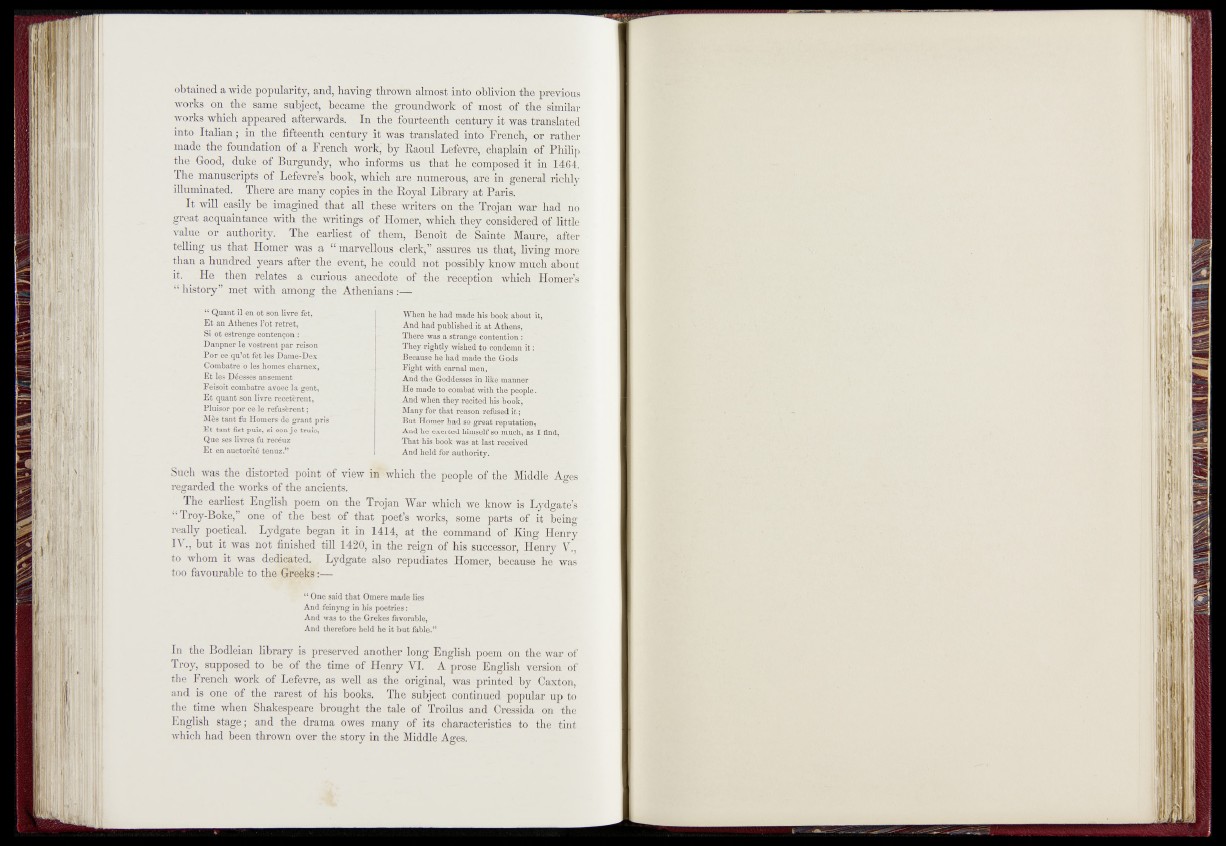
obtained a wide popularity, and, having thrown almost'into pbhvion'tht|^&£»us
works on the same subject, -became the groundwork of most of the &rmiW
works which appeared afterwards. In^the fourteenth Gentury. it was ^§£|lated
into Italian; in the fifteenth century it was. translated into’:'French,', or'rather
made the foundation of a French work; by Raoul Lefevre,' chaplain of dShalip
the Good, duke of Burgundy; "who informs us that he, composed it-in 1464.
The manuscripts of Lefevre’s book, which are numerous, are in genera!'-richly
iUuminated. There .are many copies in the' Royal Library at Paris.
It will easily 0 ^ imagined that all these writers omthe Trojan war had, no
great acquaintance with the writings-of Homer, which they considered of>little
value or authority. The earliest of them, Benoit- de - S&inte Maurej. ‘after
telling us that Homer was a “ marvellous clerk,” assures us that, living more
than a hundred years after the"event, he could not possibly^know much about
it. He then relates a curious anecdote of the - reception - which Homer’s
“ history” met with among the Athenians
“ Quant il en ot son livre fet,
E t an' Athènes Pot retret,
Si ot estrenge contençon :
Danpner le vostrent par reison
Por ce qu’ot fet les Dame-Dex
Combatre o les. homes charnex,
Et les Déesses ansement
Feisoit combatre avoec la gent,
E t quant son livre recelèrent,
Pluisor por c&le refusèrent ;
Mes tant fii Homers de grant pris
E t tant fist puis, si eon je truis, -
Que ses livres fa recéuz
E t en auctorité tenuz.”
When he had made his book about dt,
And had published it at Athens,
'There was a strange contention: "
-They rightly wif hed to 'oonqeiiin.it
Because hC had made t h e ^ S S f i
Eight with carnal men, .to ,
And the Goddesses in Jike mainjeri 1
He made to combat with tbe'beople.Y-.
And when they recited Ms-boqk’'^.*
Many for that reason refused i t ;
But Homer had so great reputation,
And he exerted himself so-muchf as I find,
That hia-book was-at last received
And h eld' for^authority.,
Such-was the) distorted point of view inlwhich the people of "the "Middle--Ages
regarded the works of the ancients.
The earliest English poem on the Trojan War which -we know-is Lydgate’s
li Troy-Boke, one of the best of that poet’s works, some parts of rit "Tiding
really poetical. Lydgate began it in 1414, at the command of King Henry
IY., but it was not finished till 1420, in the reign'of his successor, Henry Y.,
to whom it was dedicated. , Lydgate also repudiates Homer, because he was-
too favourable to the Greeks:—
^ Y ‘vOne said that Omere made lies
And feinyng in his poetries:
And was to the Grekes favorable,
And therefore held he it but fable.”
In the Bodleian library is preserved another long English poem on the war of
“Troy, supposed to be of the time- of Henry YI. A prose English version-of.
the French work of Lefevre, as -well as the original, was printed by .Caxton,
and is one of the rarest of his books. The subject continued-popular up to
the time when Shakespeare brought the tale of Troilus and Cressida on the
English stage; and the drama owes many of its characteristics to the tint
which had been thrown over the story in the Middle Ages.